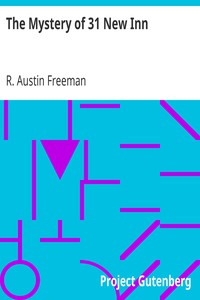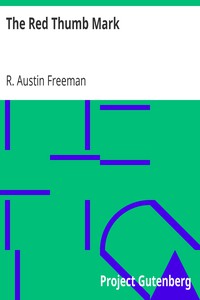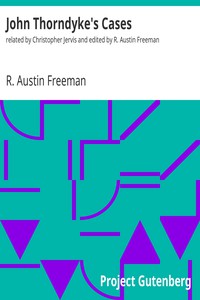The Mystery of 31 New Inn by R. Austin Freeman (adult books to read .TXT) 📗

- Author: R. Austin Freeman
Book online «The Mystery of 31 New Inn by R. Austin Freeman (adult books to read .TXT) 📗». Author R. Austin Freeman
With this the two lawyers took their departure, leaving me to meditate upon my colleague's astonishing statement; which I did, considerably to the prejudice of other employment. That Thorndyke would be able to justify the opinion that he had given, I had no doubt whatever; but yet there was no denying that his proposition was what Mr. Dick Swiveller would call "a staggerer."
When Thorndyke returned, I informed him of the visit of our two friends, and acquainted him with the sentiments that they had expressed; whereat he smiled with quiet amusement.
"I thought," he remarked, "that letter would bring Marchmont to our door before long. As to Winwood, I have never met him, but I gather that he is one of those people whom you 'mustn't mind.' In a general way, I object to people who tacitly claim exemption from the ordinary rules of conduct that are held to be binding on their fellows. But, as he promises to give us what the variety artists call 'an extra turn,' we will make the best of him and give him a run for his money."
Here Thorndyke smiled mischievously—I understood the meaning of that smile later in the evening—and asked: "What do you think of the affair yourself?"
"I have given it up," I answered. "To my paralysed brain, the Blackmore case is like an endless algebraical problem propounded by an insane mathematician."
Thorndyke laughed at my comparison, which I flatter myself was a rather apt one.
"Come and dine," said he, "and let us crack a bottle, that our hearts may not turn to water under the frown of the disdainful Winwood. I think the old 'Bell' in Holborn will meet our present requirements better than the club. There is something jovial and roystering about an ancient tavern; but we must keep a sharp lookout for Mrs. Schallibaum."
Thereupon we set forth; and, after a week's close imprisonment, I once more looked upon the friendly London streets, the cheerfully lighted shop windows and the multitudes of companionable strangers who moved unceasingly along the pavements.
Chapter XV Thorndyke Explodes the Mine
We had not been back in our chambers more than a few minutes when the little brass knocker on the inner door rattled out its summons. Thorndyke himself opened the door, and, finding our three expected visitors on the threshold, he admitted them and closed the "oak."
"We have accepted your invitation, you see," said Marchmont, whose manner was now a little flurried and uneasy. "This is my partner, Mr. Winwood; you haven't met before, I think. Well, we thought we should like to hear some further particulars from you, as we could not quite understand your letter."
"My conclusion, I suppose," said Thorndyke, "was a little unexpected?"
"It was more than that, sir," exclaimed Winwood. "It was absolutely irreconcilable either with the facts of the case or with common physical possibilities."
"At the first glance," Thorndyke agreed, "it would probably have that appearance."
"It has that appearance still to me." said Winwood, growing suddenly red and wrathful, "and I may say that I speak as a solicitor who was practising in the law when you were an infant in arms. You tell us, sir, that this will is a forgery; this will, which was executed in broad daylight in the presence of two unimpeachable witnesses who have sworn, not only to their signatures and the contents of the document, but to their very finger-marks on the paper. Are those finger-marks forgeries, too? Have you examined and tested them?"
"I have not," replied Thorndyke. "The fact is they are of no interest to me, as I am not disputing the witnesses' signatures."
At this, Mr. Winwood fairly danced with irritation.
"Marchmont!" he exclaimed fiercely, "you know this good gentleman, I believe. Tell me, is he addicted to practical jokes?"
"Now, my dear Winwood," groaned Marchmont, "I pray you—I beg you to control yourself. No doubt—"
"But confound it!" roared Winwood, "you have, yourself, heard him say that the will is a forgery, but that he doesn't dispute the signatures; which," concluded Winwood, banging his fist down on the table, "is damned nonsense."
"May I suggest," interposed Stephen Blackmore, "that we came here to receive Dr. Thorndyke's explanation of his letter. Perhaps it would be better to postpone any comments until we have heard it."
"Undoubtedly, undoubtedly," said Marchmont. "Let me entreat you, Winwood, to listen patiently and refrain from interruption until we have heard our learned friend's exposition of the case."
"Oh, very well," Winwood replied sulkily; "I'll say no more."
He sank into a chair with the manner of a man who shuts himself up and turns the key; and so remained—excepting when the internal pressure approached bursting-point—throughout the subsequent proceedings, silent, stony and impassive, like a seated statue of Obstinacy.
"I take it," said Marchmont, "that you have some new facts that are not in our possession?"
"Yes," replied Thorndyke; "we have some new facts, and we have made some new use of the old ones. But how shall I lay the case before you? Shall I state my theory of the sequence of events and furnish the verification afterwards? Or shall I retrace the actual course of my investigations and give you the facts in the order in which I obtained them myself, with the inferences from them?"
"I almost think," said Mr. Marchmont, "that it would be better if you would put us in possession of the new facts. Then, if the conclusions that follow from them are not sufficiently obvious, we could hear the argument. What do you say, Winwood?"
Mr. Winwood roused himself for an instant, barked out the one word "Facts," and shut himself up again with a snap.
"You would like to have the new facts by themselves?" said Thorndyke.
"If you please. The facts only, in the first place, at any rate."
"Very well," said Thorndyke; and here I caught his eye with a mischievous twinkle in it that I understood perfectly; for I had most of the facts myself and realized how much these two lawyers were likely to extract from them. Winwood was going to "have a run for his money," as Thorndyke had promised.
My colleague, having placed on the table by his side a small cardboard box and the sheets of notes from his file, glanced quickly at Mr. Winwood and began:
"The first important new facts came into my possession on the day on which you introduced the case to me. In the evening, after you left, I availed myself of Mr. Stephen's kind invitation to look over his uncle's chambers in New Inn. I wished to do so in order to ascertain, if possible, what had been the habits of the deceased during his residence there. When I arrived with Dr. Jervis, Mr. Stephen was in the chambers, and I learned from him that his uncle was an Oriental scholar of some position and that he had a very thorough acquaintance with the cuneiform writing. Now, while I was talking with Mr. Stephen I made a very curious discovery. On the wall over the fire-place hung a large framed photograph of an ancient Persian inscription in the cuneiform character; and that photograph was upside down."
"Upside down!" exclaimed Stephen. "But that is really very odd."
"Very odd indeed," agreed Thorndyke, "and very suggestive. The way in which it came to be inverted is pretty obvious and also rather suggestive. The photograph had evidently been in the frame some years but had apparently never been hung up before."
"It had not," said Stephen, "though I don't know how you arrived at the fact. It used to stand on the mantelpiece in his old rooms in Jermyn Street."
"Well," continued Thorndyke, "the frame-maker had pasted his label on the back of the frame, and as this label hung the right way up, it appeared as if the person who fixed the photograph on the wall had adopted it as a guide."
"It is very extraordinary," said Stephen. "I should have thought the person who hung it would have asked Uncle Jeffrey which was the right way up; and I can't imagine how on earth it could have hung all those months without his noticing it. He must have been practically blind."
Here Marchmont, who had been thinking hard, with knitted brows, suddenly brightened up.
"I see your point," said he. "You mean that if Jeffrey was as blind as that, it would have been possible for some person to substitute a false will, which he might sign without noticing the substitution."
"That wouldn't make the will a forgery," growled Winwood. "If Jeffrey signed it, it was Jeffrey's will. You could contest it if you could prove the fraud. But he said: 'This is my will,' and the two witnesses read it and have identified it."
"Did they read it aloud?" asked Stephen.
"No, they did not," replied Thorndyke.
"Can you prove substitution?" asked Marchmont.
"I haven't asserted it," answered Thorndyke, "My position is that the will is a forgery."
"But it is not," said Winwood.
"We won't argue it now," said Thorndyke. "I ask you to note the fact that the inscription was upside down. I also observed on the walls of the chambers some valuable Japanese colour-prints on which were recent damp-spots. I noted that the sitting-room had a gas-stove and that the kitchen contained practically no stores or remains of food and hardly any traces of even the simplest cooking. In the bedroom I found a large box that had contained a considerable stock of hard stearine candles, six to the pound, and that was now nearly empty. I examined the clothing of the deceased. On the soles of the boots I observed dried mud, which was unlike that on my own and Jervis's boots, from the gravelly square of the inn. I noted a crease on each leg of the deceased man's trousers as if they had been turned up half-way to the knee; and in the waistcoat pocket I found the stump of a 'Contango' pencil. On the floor of the bedroom, I found a portion of an oval glass somewhat like that of a watch or locket, but ground at the edge to a double bevel. Dr. Jervis and I also found one or two beads and a bugle, all of dark brown glass."
Here Thorndyke paused, and Marchmont, who had been gazing at him with growing amazement, said nervously:
"Er—yes. Very interesting. These observations of yours—er—are—"
"Are all the observations that I made at New Inn."
The two lawyers looked at one another and Stephen Blackmore stared fixedly at a spot on the hearth-rug. Then Mr. Winwood's face contorted itself into a sour, lopsided smile.
"You might have observed a good many other things, sir," said he, "if you had looked. If you had examined the doors, you would have noted that they had hinges and were covered with paint; and, if you had looked up the chimney you might have noted that it was black inside."
"Now, now, Winwood," protested Marchmont in an agony of uneasiness as to what his partner might say next, "I must really beg you—er—to refrain from—what Mr. Winwood means, Dr. Thorndyke, is that—er—we do not quite perceive the relevancy of these—ah—observations of yours."
"Probably not," said Thorndyke, "but you will perceive their relevancy later. For the present, I will ask you to note the facts and bear them in mind, so that you may be able to follow the argument when we come to that.
"The next set of data I acquired on the same evening, when Dr. Jervis gave me a detailed account of a very strange adventure that befell him. I need not burden you with all the details, but I will give you the substance of his story."
He then proceeded to recount the incidents connected with my visits to Mr. Graves, dwelling on the personal peculiarities of the parties concerned and especially of the patient, and not even forgetting the very singular spectacles worn by Mr. Weiss. He also explained briefly the construction of the chart, presenting the latter for the inspection of his hearers. To this recital our three visitors listened in utter bewilderment, as, indeed did I also; for I could not conceive in what way my adventures could possibly be related to the affairs of the late Mr. Blackmore. This was manifestly the view taken by Mr. Marchmont, for, during a pause in which the chart was handed to him, he remarked somewhat stiffly:
"I am assuming, Dr. Thorndyke, that the curious story you are telling us has some relevance to the matter in which we are interested."
"You are quite correct in your assumption," replied Thorndyke. "The story is very relevant indeed, as you will presently be convinced."
"Thank you," said Marchmont, sinking back once more into his chair with a sigh of resignation.
"A few days ago," pursued Thorndyke, "Dr. Jervis and I located, with the aid of this chart, the house to which he had been called. We found





Comments (0)